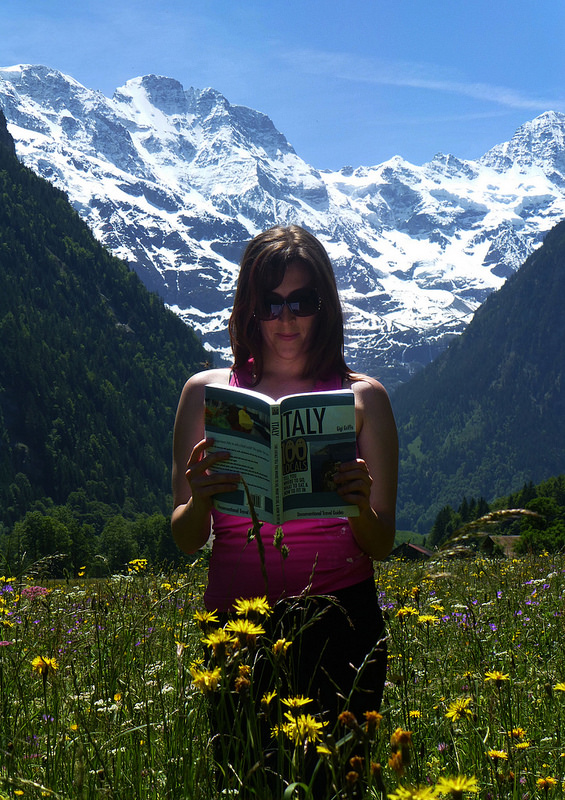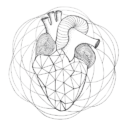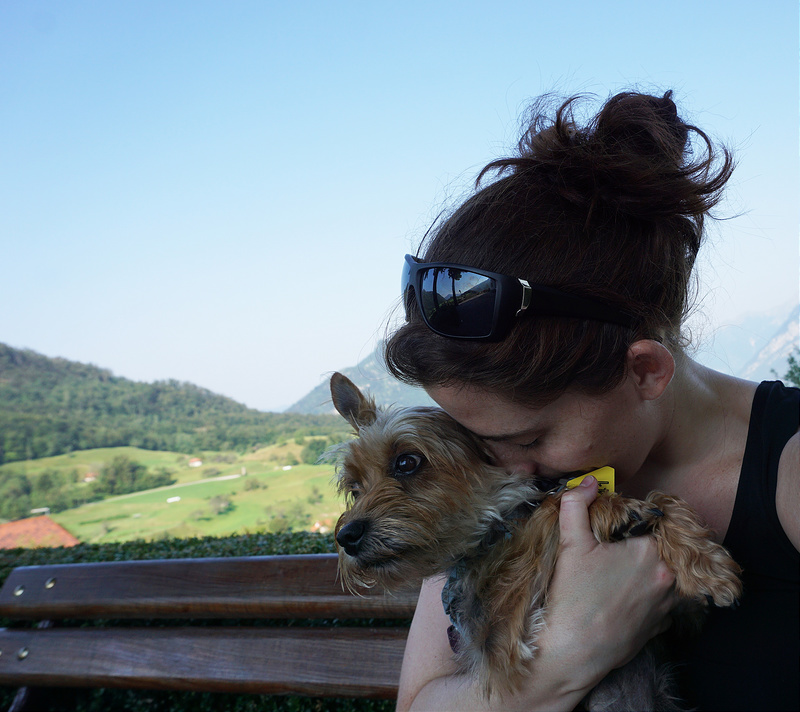Surviving (and thriving within) nomadism, from those living without a fixed home
In part 1 of this series of interviews I speak to world-traveling entrepreneur and writer Gigi Griffis. In May 2012, Gigi sold her stuff, left Denver Colorado and took to the road with a growing business and a pint-sized pooch. She’s the author of seven guidebooks and a sassy little travel blog at gigigriffis.com.
Which area of the world are you living in right now? How long have you been nomadic?
I’m currently road tripping across Canada from Quebec City in the east to Vancouver in the west. I’m writing to you from a cute little hotel suite just outside downtown Toronto, where I’m working today. Tomorrow, I’m off to a small town called Marathon on Lake Ontario.
I’ve been nomadic for just over four years now. I boarded a plane for Scotland (my first stop) with my hiking backpack and my small dog on May 30th, 2012.
Why are you a nomad? Was it a conscious choice or something that came about through circumstance?
Honestly, it’s kind of both. When I left Denver, I was having a really rough time, struggling with depression, feeling disconnected from the place I was living and the people I knew. So, in part, it was circumstances that drove me to a nomadic life. I needed a big change. I had always loved traveling. And I was already working as a freelancer with clients around the US. So doing that work and living my life from the road just made sense.
I love feeling like my life is my own.
Of course, I was also scared at first, mostly that I’d get to Europe and somehow lose all my clients (a very unfounded fear that didn’t turn out to be true). But it also seemed like an infinitely right next step to take.
Now, four years later, I’m most definitely a nomad by choice. I fell in love with the utter freedom of it. Not because I need to constantly travel (in fact, I spent over a year living in Switzerland and just spent four months in Arizona, so I’m a pretty slow traveler), but because I love feeling like my life is my own. I can go if I want to go. I can stay if I want to stay. I can road trip quickly across Canada (as I’m doing now) or stay in one place for three months or six months or two years or 10 years. If I’m lonely, I can go live by my best friend for a while. If I need introvert time, I can retreat to a tiny village where I know no one.
For me, being a digital nomad isn’t defined by the movement (though I do love to move); it’s defined by the freedom. I am not tied down to any one place, one apartment, one daily routine.
How do you support yourself financially?
I’m a writer and content strategist, which means I write everything from books to blog posts, websites, and magazine articles, and I also do strategy work, helping companies or people understand what content they need, how to present it, how to keep it updated and relevant, etc.
My business has shifted a bit over the four years of traveling, first being solely content strategy and copywriting, then slowly becoming more travel writing-focused, and now merging the two things (which I am really enjoying).
At the moment, my books make up about half my income and the other half comes from writing and strategy work. While I’m traveling through Canada, I’m working about 20 hours a week.

What has been your most difficult moment so far? How did you cope with it?
When I was going from Paris to the UK for a conference, I was detained and questioned by British Immigration. It was awful. I was shouted at. The room was freezing. There was no real reason for it (the woman basically just kept calling me a liar about everything from how much money I had in the bank to when I was going to leave the country). And it took them 3.5 hours to tell me I wasn’t going to be allowed into the country that day. They then handed me over to the French police and I had to find a place to stay and figure out a way to get to my conference. It was the most anxious, stressful, awful experience of my life. I felt totally powerless.
A close second was the time I got seriously ill and was hospitalised in Malta, then spent the next year dealing with recovery and complications. That was extremely difficult.
As for coping with the immigration issue, I went back into Paris, had a good, long, public cry (while a panicked Frenchman brought me tissues), contacted a friend to see if I could stay with her that night, and then printed out proof of everything the immigration officer had accused me of lying about (my financial statements, proof of my conference attendance…all stuff that is not technically required at border crossings and therefore I hadn’t been carrying). I booked a ferry crossing to the UK for the next day (because I just couldn’t handle the train immigration people again), explained that it all was a misunderstanding, begged to be allowed to go to my conference, and eventually they stamped me in…but just for two weeks, instead of the two months I’d planned to stay there.
I spent that panicked two weeks attending my conference and re-planning my next three months of travel. Since I couldn’t stay in the UK, I needed a new plan fast. I decided I needed to be somewhere warm, stay in one place for a longer period of time, and be somewhere cheap (as this unexpected plan change was going to cost a fortune in airline tickets). So I went to Mexico for three-ish months to recover and rethink.
I actually thought about quitting then. Thought about how easy it would be just to go back to Denver for a while. But after a few quiet months in Mexico, I remembered what I loved about travel and decided to carry on—but just avoid the UK in future (since I’m now—for no reason whatsoever—on some sort of hold list for 10 years and will be detained any time I enter the country).
To this day, I still get a spike of anxiety any time I pass through any border immigration line.
And the best?
There are so many moments to choose from. Riding a motorcycle down the coast of Croatia is among my favourite memories, as is hiking to the top of Schilthorn in the Swiss Alps. If I had to pick just one, though, I think it would be the moment in Mexico, when I realised that I’d found my joy.
There was also a beautiful rush when I first arrived in Scotland and realised I’d really done it. I’d really left my old home behind for something new. It was exhilarating.
Being on the road, how do you feel about having a sense of home? Is it important to you? Do you find it on the road? Do you have any practices that help you with this?
First, I think I should say that I’m not a person who has ever put down roots. I didn’t feel at home in Virginia (where I grew up) or New York or Denver. They were interesting adventures, certainly, but I never felt homesick for those places or loved them the way I love movement.
So, for me, home has always been more about feeling connected to people and to myself. When I’m traveling, I don’t miss Arizona or Slovenia or Belgium, but I do miss my best friends and the communities I’ve found along the way. And so staying connected to home, for me, is about staying connected to the people I love. It means visits and traveling together and Skype calls and emails. And it also means making sure I have a community in new places along the way.
This is why I stay longer in most places, living in Switzerland for over a year, staying for three months in Vancouver this summer, making my home in northern Arizona for four months this winter. Staying longer gives you time to contribute to and connect with the local community, to feel at home.

Finally, I have to mention my dog, Luna. She’s been with me this whole time and her presence does a lot to make me feel at home. Not only is she consistently there, my anchor, but she is also a constant connection to communities. When you’re traveling with a dog, people assume you’re staying longer, they assume you’re worth connecting with, and they reach out. I can’t tell you how many times Luna has been the thing that forged my connection with new people and the place I’m living.
What about your support network? Do you have one? Is it local, online? How have relationships with friends evolved since you’ve been location independent?
All my life, the people I’ve been drawn to are the adventurers, travellers, creative types…and so even when I was living in one place, my support network was scattered around the world. My best friend lived in Denver, then Chicago, then LA, and now northern Arizona. My other close friends call places like Paris, Pennsylvania, Berlin, and the Swiss Alps home. And so making sure I was connected to the people I love was always a challenge, even before I started traveling.
These days, I do everything from Skype to email to Facebook messages. And, because I’m a full-time traveler, I also have more freedom to visit my friends and stay in their towns longer than I’d otherwise be able. That’s why I spent four months this winter in Arizona—to be near my best friend. I also frequently find myself in Paris to be near another friend. And I’ve passed through Pennsylvania twice in the last year to see a third friend.
I am also lucky enough that many of my friends are also world travellers and can sometimes join me for a trip. My friend Ali and I spent two weeks in Amsterdam before I left Europe last fall. My friend Emily has visited me in Denver and Switzerland. My friend Holly came to Belgium.
And, finally, very recently I met and fell for another traveller, so I’m no longer traveling alone and now have a built-in support network, which is a massive and wonderful change.

What has been your biggest learning from this experience so far?
Life isn’t pass-fail. It’s not all-or-nothing. You don’t have to be a full-time nomad or a chained-to-the-desk 9-to-5er.
“There are a thousand ways to live your life and the one you choose is yours to tweak. “
I get a lot of questions from people about how to live a nomadic life…how fast they should travel, what kind of work they should do…and there is no “should.” Do the work you’re good at, that supports you, that you like doing, that you’re willing to do. Travel at your own pace. Tweak it as you go. Don’t be afraid to say “this isn’t for me” about anything – be it the way you’re work is going, the place you’re in, the style of travel, or even nomadic life itself.
I’ve learned to let go of some of my all-or-nothing mindset and realize that one lost client won’t ruin me, one horrible immigration officer won’t break me, one route change isn’t a failure.
Top tips for those thinking about going nomadic?
:: Give yourself enough time. Remember that you’re working while traveling, so you’ll need more time in a place if you want to see all the things you’d see on vacation. Start slow and you can always speed up your pace if you find you’re bored or need more movement.
:: Give yourself a buffer. If you’re already making enough money to support yourself on the road, excellent, enjoy! If you’re starting a business or going freelance, though, make sure you have a buffer and a backup plan.
You shouldn’t be living month-to-month.
For me, this meant that I didn’t quit my full-time job to freelance until I was already breaking even on expenses with freelancing in my spare time and I also had 10 months worth of expenses in my savings account, so if, heaven forbid, something happened, I was covered. Similarly, I didn’t start traveling until I was making a little more than I needed to live on and I had 12 months of expenses in the bank. Your numbers might be different, but do plan for contingencies. And remember, there’s no shame in stopping or slowing down for a while to make sure you have your income situation handled.
:: Plan for time with friends. The biggest concern I hear within the nomadic community is loneliness. Making time for friends, going to live near your community for awhile, living long enough in a new place to create a community…all these things help.



